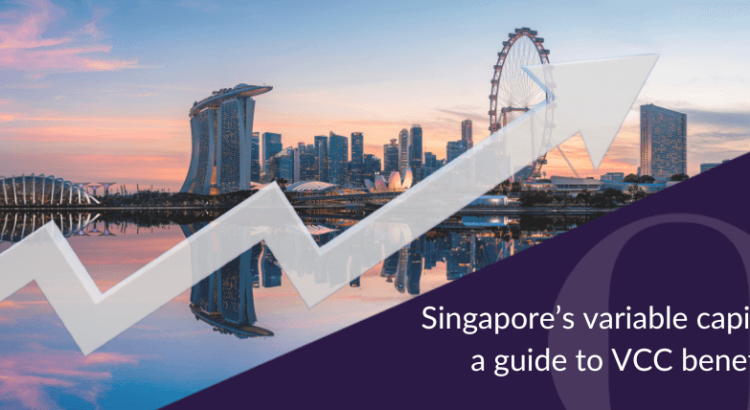In the evolving landscape of Singapore’s financial sector, variable capital companies (VCCs) have emerged as a prominent and flexible solution for diverse investment needs.
Thanks to its innovative structure, the VCC has led an increase in investment flows into the city-state, and has helped to propel Singapore firmly onto the global stage as a destination of choice for fund managers and family offices. This has also led to opportunities for professionals through the creation of local jobs. In response to the high demand, the Singaporean government recently extended the Variable Capital Companies Grant Scheme to 15 January 2025.
This article provides an overview of the VCC to help you decide if it is the right investment vehicle for you. In consultation with multiple business experts, we explain what a variable capital company is and the benefits it offers. We will also explain the setup process and provide advice for giving your entity the best chance of success in the region.
The VCC structure and its unique benefits
The VCC is an innovative structure offering many benefits for investment managers in Singapore – particularly high-net-worth individuals and families.
“The introduction of the VCC Framework at the start of 2020 further strengthened Singapore’s value proposition as a leading full-service asset management hub,” explains Eunice Hooi, Head of Corporate Secretarial for BoardRoom Singapore.
Like private limited companies, VCCs are governed by a board of directors and have shareholders who own shares in the fund. They also offer limited liability for shareholders and directors, as they are considered a separate legal personality (this means that shareholders and directors are protected in cases of litigation against the company).
However, VCCs have unique benefits that may make them a preferred structure for investment managers. In contrast to other investment structures, VCCs offer:
- operational flexibility;
- tax efficiency, and
- privacy.

Importantly, fund managers can use VCCs for both open- and close-ended funds. Open-ended funds allow investors to freely invest, redeem or withdraw shares without shareholder approval, empowering them to respond swiftly to market changes. “VCCs can also pay dividends out of capital, giving fund managers the flexibility to meet their dividend payment obligations,” says Zhan Aijuan, Senior Manager of Corporate Secretarial for BoardRoom Singapore.
In addition, VCCs can incorporate new funds and re-domicile existing funds to a new location.
“VCCs can also enjoy the extensive tax treaty network that the Singapore government has with over 85 countries,” Eunice adds.
VCCs can be set up as:
- a standalone fund or
- an umbrella VCC with two or more sub-funds, each holding a portfolio of separate assets and liabilities.
Josephine Toh, Associate Director of Corporate Secretarial for BoardRoom Singapore, adds that umbrella VCCs can offer valuable economies of scale.
“VCCs need to appoint a variety of professionals, such as fund managers, company secretaries and auditors,” she says. “Umbrella VCCs enable investors to achieve economies of scale by splitting the cost of using the same professionals across all sub-funds.”
Further, the fund managers can claim a 30% reduction on qualifying VCC set-up costs paid to Singapore-based service providers through the Variable Capital Companies Grant Scheme.
Regulatory requirements for VCCs
Compliance requirements for VCCs encompass stringent reporting standards and governance mechanisms to promote transparency and accountability.
The Variable Capital Companies Act governing VCCs in Singapore is relatively new, and therefore will continue to develop. Fund managers must ensure their VCC complies with this legislation as it evolves.
VCCs also have obligations to the Monetary Authority of Singapore (MAS), such as the implementation of processes for anti-money laundering and countering the financing of terrorism.
Key requirements for the setting up of VCCs include:
- at least one ordinarily resident director in Singapore;
- one qualified MAS licensee as a fund manager (this can be the same person as the local resident director);
- a registered office in Singapore;
- a Singapore-based company secretary; and
- an auditor and annual audits.
Setting up a Singapore VCC
A prominent feature of the VCC framework is the option for fund managers to either set up a new VCC or re-domicile their existing investment funds with comparable structures to Singapore. This flexibility offers a range of advantages and can significantly enhance the fund manager’s operations. Below are the steps in incorporating a new VCC or re-domiciling existing investment funds.
Incorporating a new VCC
Companies seeking to expand their presence in Singapore or tap into the benefits of the VCC structure can set up a new VCC. Here are the key steps involved:
INCORPORATING A NEW VCC
Register a VCC name via the VCC Portal. Once approved, the VCC must be incorporated within 120 days and adhere to any potential reviews by Referral Authorities.
Decide between establishing a non-umbrella VCC or an umbrella VCC that contains multiple sub-funds with segregated assets and liabilities.
Appoint VCC officers, including director, company secretary, auditor and fund manager. At this point, you will also need to decide on the VCC's first financial year end (FYE) and determine the accounting period length.
Provide a publicly accessible registered office address for the VCC and submit a constitution detailing the VCC's governance, operations and key stakeholder rights and responsibilities.
This can be done directly through the VCC Portal or via a registered filing agent or corporate service provider. The processing time can range from 14 to 60 days, depending on any additional governmental reviews.
Register individual sub-funds under an umbrella structure of a VCC.

Re-domiciling existing investment funds
For fund managers with existing overseas investment funds that align with the VCC framework’s criteria, the option to re-domicile these funds to Singapore can be an efficient and cost-effective strategy. This process involves transferring the registration and legal domicile of an existing fund to Singapore while retaining its existing structure. Here are the key requirements needed for re-domiciling existing investment funds:
Eligibility assessment: Fund managers must first determine whether their existing investment funds meet the criteria for re-domiciliation to a Singapore VCC. The existing fund should have a similar structure and characteristics to that of a VCC, making it a suitable candidate for re-domiciliation.
Approval from shareholders: In most cases, the existing fund’s shareholders must approve the re-domiciliation. This process may require a special resolution or a majority vote, per the fund’s existing legal structure.
Regulatory compliance: Fund managers should ensure that the re-domiciliation process aligns with the regulatory requirements of both the fund’s current jurisdiction and Singapore.
Transfer of assets and liabilities: As part of the re-domiciliation process, assets and liabilities of the existing fund must be appropriately transferred to the newly incorporated Singapore VCC. If applicable, this transfer process should ensure the segregation of assets and liabilities for each sub-fund.
Appointment of local service providers: Engage local service providers, including a permissible fund manager, company secretary, and auditor, to ensure compliance with the VCC Act’s requirements. The engagement of these professionals is crucial for ongoing compliance.
Re-domiciliation application: Submit the necessary documentation to the Monetary Authority of Singapore (MAS) for approval of the re-domiciliation. The application should include details of the existing fund, the proposed Singapore VCC structure, and other relevant information.
Tax implications: Consider the tax implications of re-domiciling the fund to Singapore. Collaborate with tax advisors to maximise the benefits available under Singapore’s tax incentive schemes, such as the Singapore Resident Fund Scheme or the Enhanced-Tier Fund Scheme.

A trusted partner in Singapore VCC incorporation
The VCC in Singapore is transforming the investment landscape, offering flexibility, tax benefits and privacy. It attracts wealth, creates jobs and solidifies Singapore’s position as a global financial hub. Setting up a VCC in Singapore involves navigating a complex landscape of legal, financial, and regulatory requirements.
BoardRoom, as a trusted partner with more than 50 years of experience in corporate services, can guide you through each step of the process, from registering your company to corporate secretarial services and setting up an efficient tax structure. BoardRoom can also ensure your accounting and tax compliance meet local and APAC-wide standards for your VCC in Singapore.
Contact us today to discuss how we can help set up your VCC and optimise the tax incentives.
Contact BoardRoom for more information:
Related Business Insights
-

08 Jul 2024
Your Guide to Corporate Tax Filing in Singapore
Learn to navigate corporate tax filing in Singapore effectively and ensure timely, compliant submissions with our c …
READ MORE -

14 Jun 2024
Comprehensive Guide to XBRL Filing Requirement in Singapore
Explore the essentials of XBRL filing in Singapore, covering mandatory requirements, benefits, preparation steps, a …
READ MORE -

11 Jun 2024
Corporate governance best practices at all levels of the company
Corporate governance goes beyond compliance, shaping the fabric of an organisation. Discover the corporate governan …
READ MORE









